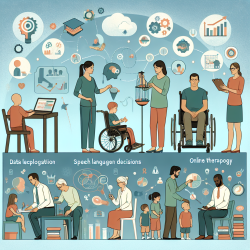Enhancing Practitioner Skills Through Relational Insights
In the realm of speech-language pathology and online therapy services, understanding the relational dynamics that influence health behaviors can be pivotal in enhancing outcomes for children. A recent study titled Relational Factors and HIV Testing Practices: Qualitative Insights from Urban Refugee Youth in Kampala, Uganda offers valuable insights that can be applied to improve therapeutic practices.
Key Findings from the Study
The study explored the relational contexts that shape HIV testing among urban refugee youth in Kampala, Uganda. It highlighted the importance of both informal (intimate partners and family members) and formal (peer educators and professionals) sources of social support. These findings underscore the complex interplay of relational factors in health decision-making.
Implications for Practitioners
Practitioners can draw several actionable insights from this study to enhance their practice:
- Emphasize Relational Dynamics: Understanding the relational contexts of clients can aid in tailoring interventions that consider family dynamics and peer influences.
- Leverage Social Support: Encourage the involvement of supportive family members and peers in therapy sessions to enhance engagement and outcomes.
- Build Trust and Communication: Foster open communication channels between clients and their support networks to mitigate fears and misconceptions.
Encouraging Further Research
The study opens avenues for further research into how relational factors influence other health behaviors and outcomes. Practitioners are encouraged to explore these dynamics within their client populations to develop more effective, culturally sensitive interventions.
Conclusion
Incorporating relational insights into therapeutic practices can significantly enhance outcomes for children, especially in diverse and complex environments. By understanding and leveraging the power of social support networks, practitioners can create more effective and personalized therapy plans.
To read the original research paper, please follow this link: Relational Factors and HIV Testing Practices: Qualitative Insights from Urban Refugee Youth in Kampala, Uganda.










